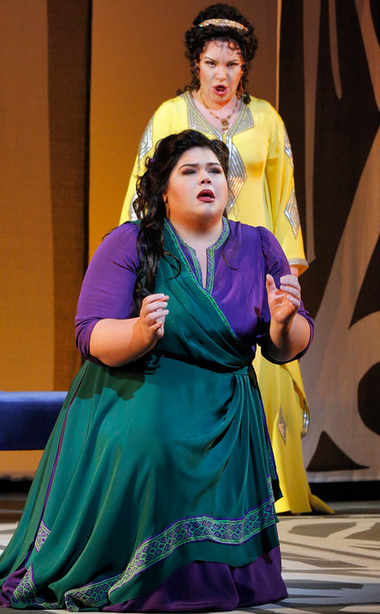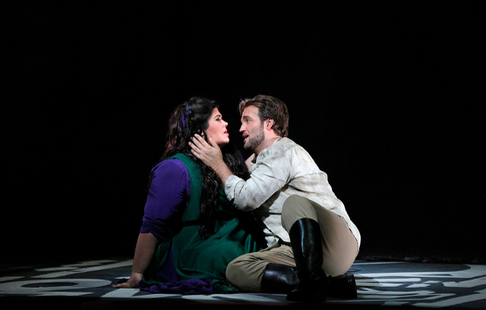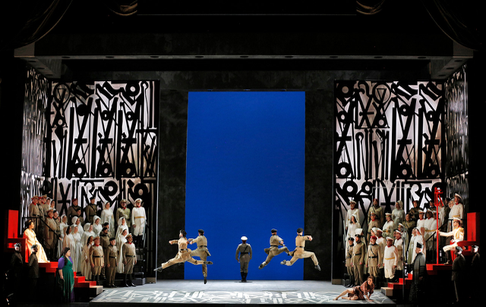
11 Nov 2016
Aida in San Francisco
An exquisite pit, a Busby Berkeley stage, ingenue performers. Populist opera in San Francisco — in November eleven performances of Aida (alternating with ten of Madama Butterfly).
English Touring Opera are delighted to announce a season of lyric monodramas to tour nationally from October to December. The season features music for solo singer and piano by Argento, Britten, Tippett and Shostakovich with a bold and inventive approach to making opera during social distancing.
This tenth of ten Live from London concerts was in fact a recorded live performance from California. It was no less enjoyable for that, and it was also uplifting to learn that this wasn’t in fact the ‘last’ LfL event that we will be able to enjoy, courtesy of VOCES8 and their fellow vocal ensembles (more below …).
Ever since Wigmore Hall announced their superb series of autumn concerts, all streamed live and available free of charge, I’d been looking forward to this song recital by Ian Bostridge and Imogen Cooper.
The Sixteen continues its exploration of Henry Purcell’s Welcome Songs for Charles II. As with Robert King’s pioneering Purcell series begun over thirty years ago for Hyperion, Harry Christophers is recording two Welcome Songs per disc.
Although Stile Antico’s programme article for their Live from London recital introduced their selection from the many treasures of the English Renaissance in the context of the theological debates and upheavals of the Tudor and Elizabethan years, their performance was more evocative of private chamber music than of public liturgy.
In February this year, Albanian soprano Ermonela Jaho made a highly lauded debut recital at Wigmore Hall - a concert which both celebrated Opera Rara’s 50th anniversary and honoured the career of the Italian soprano Rosina Storchio (1872-1945), the star of verismo who created the title roles in Leoncavallo’s La bohème and Zazà, Mascagni’s Lodoletta and Puccini’s Madama Butterfly.
Evidently, face masks don’t stifle appreciative “Bravo!”s. And, reducing audience numbers doesn’t lower the volume of such acclamations. For, the audience at Wigmore Hall gave soprano Elizabeth Llewellyn and pianist Simon Lepper a greatly deserved warm reception and hearty response following this lunchtime recital of late-Romantic song.
Collapsology. Or, perhaps we should use the French word ‘Collapsologie’ because this is a transdisciplinary idea pretty much advocated by a series of French theorists - and apparently, mostly French theorists. It in essence focuses on the imminent collapse of modern society and all its layers - a series of escalating crises on a global scale: environmental, economic, geopolitical, governmental; the list is extensive.
For this week’s Live from London vocal recital we moved from the home of VOCES8, St Anne and St Agnes in the City of London, to Kings Place, where The Sixteen - who have been associate artists at the venue for some time - presented a programme of music and words bound together by the theme of ‘reflection’.
'Such is your divine Disposation that both you excellently understand, and royally entertaine the Exercise of Musicke.’
Amongst an avalanche of new Mahler recordings appearing at the moment (Das Lied von der Erde seems to be the most favoured, with three) this 1991 Mahler Second from the 2nd Kassel MahlerFest is one of the more interesting releases.
‘And there was war in heaven: Michael and his angels fought against the dragon; and the dragon fought and his angels, And prevailed not; neither was their place found any more in heaven … that old serpent … Satan, which deceiveth the whole world: he was cast out into the earth, and his angels were cast out with him.’
If there is one myth, it seems believed by some people today, that probably needs shattering it is that post-war recordings or performances of Wagner operas were always of exceptional quality. This 1949 Hamburg Tristan und Isolde is one of those recordings - though quite who is to blame for its many problems takes quite some unearthing.
There was never any doubt that the fifth of the twelve Met Stars Live in Concert broadcasts was going to be a palpably intense and vivid event, as well as a musically stunning and theatrically enervating experience.
‘Love’ was the theme for this Live from London performance by Apollo5. Given the complexity and diversity of that human emotion, and Apollo5’s reputation for versatility and diverse repertoire, ranging from Renaissance choral music to jazz, from contemporary classical works to popular song, it was no surprise that their programme spanned 500 years and several musical styles.
The Academy of St Martin in the Fields have titled their autumn series of eight concerts - which are taking place at 5pm and 7.30pm on two Saturdays each month at their home venue in Trafalgar Square, and being filmed for streaming the following Thursday - ‘re:connect’.
The London Symphony Orchestra opened their Autumn 2020 season with a homage to Oliver Knussen, who died at the age of 66 in July 2018. The programme traced a national musical lineage through the twentieth century, from Britten to Knussen, on to Mark-Anthony Turnage, and entwining the LSO and Rattle too.
With the Live from London digital vocal festival entering the second half of the series, the festival’s host, VOCES8, returned to their home at St Annes and St Agnes in the City of London to present a sequence of ‘Choral Dances’ - vocal music inspired by dance, embracing diverse genres from the Renaissance madrigal to swing jazz.
Just a few unison string wriggles from the opening of Mozart’s overture to Le nozze di Figaro are enough to make any opera-lover perch on the edge of their seat, in excited anticipation of the drama in music to come, so there could be no other curtain-raiser for this Gala Concert at the Royal Opera House, the latest instalment from ‘their House’ to ‘our houses’.
"Before the ending of the day, creator of all things, we pray that, with your accustomed mercy, you may watch over us."

An exquisite pit, a Busby Berkeley stage, ingenue performers. Populist opera in San Francisco — in November eleven performances of Aida (alternating with ten of Madama Butterfly).
No echoes of spectacles like the al fresco productions beneath Egypt’s pyramids or Rome’s Baths of Caracalla. Nor of San Francisco’s famed jockstrap-less gay pride Aida, or an imagined specter of a new Zefferelli production recently dismissed by the Met. No echoes at all of the big singers that have always been called upon to evoke the monumental atmospheres commemorating global transformation.
Certainly not the 1981 San Francisco production starring Luciano Pavarotti, never-mind-the-name-of-the-opera [Aida]. If there is a star for this current production it is SFO protégé Leah Crocetto who offered a very sweetly sung Aida, and succeeded in projecting the beauties of the Italian language in an intimate “Ritorna vincitor” — though marred by a premature (surely unintended) drop of the hieroglyphically encrypted show scrim.
 Leah Crocetto as Aida, Brian Jagde as Radames
Leah Crocetto as Aida, Brian Jagde as Radames
Aida’s lover Radames was SFO protégé Brian Jagde. Once we arrived at the entombment of Aida and Radames Mr. Jagde’s knife-edged voice softened and we heard, finally and with welcome relief, a voice of a sweetness and warmth that matched that of Mlle. Crocetto’s Aida. Conductor Nicola Luisotti carefully sculpted this protracted scene into one of profound operatic intimacy. It was memorable.
Luisotti made this Verdi score all about atmospheres, pulling forth every possible musical nuance to be evoked by the flow of the Nile and the glow of the Egyptian night sky. There was innocent playfulness in the Moorish dance, and even in the eruption of violence when Radames surrendered and Aida and her father fled Luisotti sustained measured strokes. More often for Luisotti these days it was a reflective reading of the score rather than a flow of dramatic points. The maestro made exquisite music of this warhorse.
If high art emanated from the pit, low taste poured forth from the stage, and it was not unintended. Stage director Francesca Zambello has been turning out provocative productions of Aida over the decades. This edition adds the hieroglyphic inspired alphabet created by L.A. artist Retna (alias of Marquis Duriel Lewis) to her provocations. These symbols (said to actually say something — but only to Retna) covered the show curtain and the huge panels of the triumphal scene, and elsewhere. You may recall his cover art for Justin Bieber's 2015 album "Purpose."
 A moment in the Triumphal Scene
A moment in the Triumphal Scene
Zambello added as well eight dancing boys, and eight more boys who danced but were not trained dancers, two of whom were accomplished acrobats. When not dancing these groups of males sometimes marched across the back of the stage. Evidently the ritualized motions of these males were intended to illustrate religious statehood. Mme. Zambello used a related movement technique as well in her La vestale at ENO some years ago.
The choreography was created by Jessica Lang, a well-known name in institutional dance. She imagined complex, highly geometrical routines whenever possible but especially in the triumphal scene where there was no procession, instead a ballet in which the eight dancing boys chased and threw around a ballerina. Mmes. Lang and Zambello enforced a crescendo of visual razzle dazzle through which we barely felt the measured pace of the maestro’s triumphal march. It was tongue-in-cheek, camp and kitsch all at once. And sort of lovable.
Zambello updated the costumes to generic uniforms and religious robes of recent periods, and the program notes declared that the supertitles would say foreigners rather than Ethiopians or slaves. Mme. Zambello’s intended message that women were looked upon as possessions of men was perhaps apparent only to her, though the hijab-less ballerina was indeed tossed about quite a bit.
Things get serious in the third act and it was here that the singers seemed undirected, left to wander in a stage space absent of context. It was here that we felt to need of heroic singers to construct the political and dynastic catastrophe that Verdi creates musically, i.e. operatically. Aida does not play as a chamber opera of familial proportions cum triumphal scene, though this premise may have precipitated the role debuts of Mlle. Crocetto and Mr. Jagde.
With the exception of the Amonastro sung by baritone George Gagnidze and the Ramfis of Raymond Aceto, both seasoned, solid professionals additional casting was inexplicable. Precocious Adler Fellow bass Anthony Reed sang the King of Egypt who invites his daughter Amneris to award Radames the triumphal crown. The supertitles were not modified to indicate the obvious — that this Amneris was twice the age of the young king and was thus his mother! Amneris, sung by Russian mezzo Ekaterina Semenchuk, found appropriate colors in her upper voice but otherwise melted into the scenery.
Michael Milenski
Cast and production information:
Aida: Leah Crocetto; Amneris: Ekaterina Semenchuk; Radames: Brian Jagde; Amonasro: George Gagnidze; Ramfis: Raymond Aceto; King of Egypt: Anthony Reed;
A Priestess: Toni Marie Palmertree; A Messenger: Pene Pati. San Francisco Opera Chorus and Orchstra. Conductor: Nicola Luisotti; Director: Francesca Zambello;
Associate Director: E. Loren Meeker; Choreographer: Jessica Lan; Artistic Designer: RETNA; Set Designer: Michael Yeargan; Costume Designer: Anita Yayich; Lighting Designer: Mark McCullough. War Memorial Opera House, San Francisco, November 8, 2016.